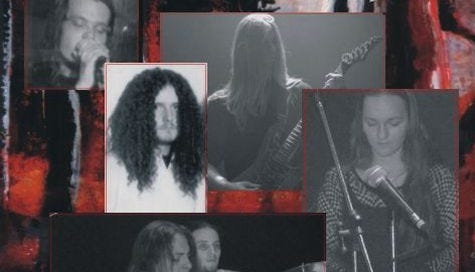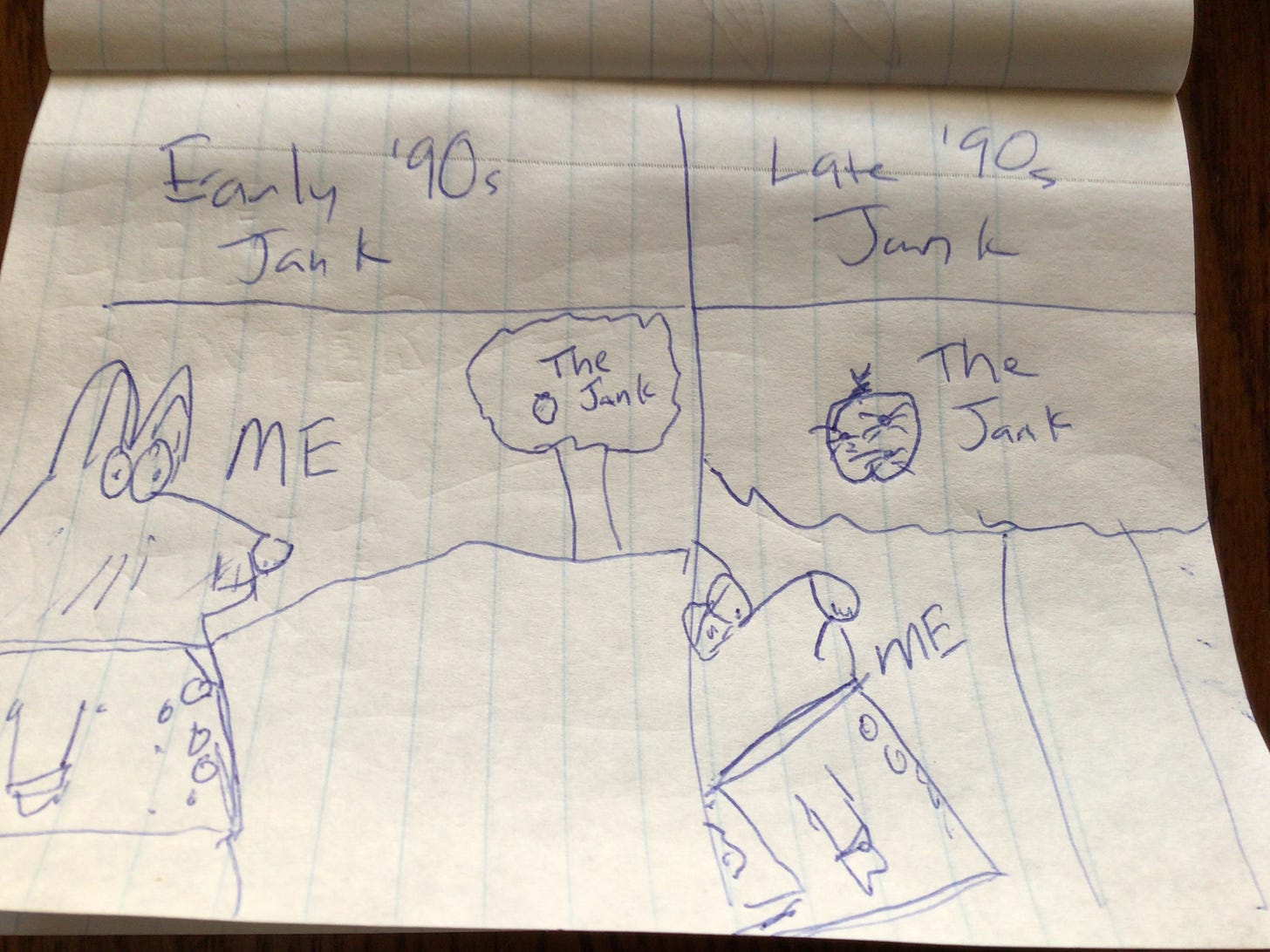https://www.metal-archives.com/band/view/id/67982
Country: Czechia
Location: Pilsen, Pilsen Region
Genre: atmospheric black/doom metal
Formed in: 1997
Status: Split-up
By the Numbers
Gold of Athanor is the:
38th band formed in the 1990s
Second band from Czechia
66th band that has split-up
Its genre tags have been seen:
Atmospheric: Seven times
Black: 56 times
Doom: 11 times
Member Connections
Many. Of note:
Mythopoeia, a melodeath/doom band from Pilsen, Pilsen Region
Sorath, a melo black/death band from Pilsen, Pilsen Region
Llyr, a melo doom/death band from Pilsen, Pilsen Region
Witchcraft, a black metal band from Třemošná, Pilsen Region
Know 'Em?
Nope. I am now 10/202.
Sketch Check
Eh, the sketch is like three or four clicks deep, if it's there at all. Going to say this band passes.
RateYourMusic Scores
Gold of Athanor has not been rated.
Adjusted scores are calculated similarly to the Trad Belt scoring system. Please read that column for more information.
Trifecta Tracker
Gold of Athanor did not achieve the trifecta.
A band can achieve the trifecta by titling a song after itself on a self-titled release. Iron Maiden's "Iron Maiden" on 1980's Iron Maiden is an example of the trifecta.
Gold of Athanor, the self-titled debut from this Czech sextet, exudes an extremely specific type of jankiness. The guitars aren't heavy. The drums slap weakly. The keyboards are what Yanni would've laid down on a scratch track. The growls have a whisper-scream wispiness, like singing Linkin Park underneath your breath while you're in a line at Walmart. Keyboardist Lucy's offsetting spokels are frozen solid thanks to an icy remove.1 Musically, Gold of Athanor is Paradise Lost zonked out on Zoloft, hazily pulling thought-threads until they're threadbare digressions. At its peppiest, it's like an overcaffeinated waiter in a puffy shirt at a theme restaurant. At its most morose, it's like something you danced to at a recital when your company couldn't get the rights to "Memories." And, oh yeah, I think the main melody of "Child's Face in the Stone" quotes Nino Rota's "Love Theme from The Godfather." I kind of love Gold of Athanor.
What a sneakily weird-ass record! Honestly, this might just be the stress of a long-ass week doing the talking, but the jankiness is a blast. It's very early '90s despite the band's career spilling into the new millennium. That is to say, if Gold of Athanor stumbled around with a more period-appropriate 2000s jankiness, I'd probably hate it. However, this does it for me because no one will ever make music like this again on purpose. It's not possible. Metalheads know too much now. This isn't path you can take honestly anymore, only ironically and extremely cynically. And, as I've written before, knowledge is what turns good jank into bad jank.
This seems like as good a time as any to trot out one of my more unhinged music criticism theories: It matters when you become musically aware. On the poppier side, you can pinpoint the start of your musical sentience when you're able to recognize about 80 to 90 percent of the songs on a given yearly chart. For example, if I look at Tunecaster's Top 100 Rock Songs, I only recognize about half of the songs in 1991, but all of the songs in 1992 might as well be embedded in my DNA. Therefore, for radio rock, 1992 is the start of my musical sentience.
This is important because I have way more context for 1992. Not only was I more musically aware, but I was also more aware, period. Therefore I have a greater understanding of the non-music dynamics at play, i.e., the conditions that allowed certain songs to capture my interest and the rest of the zeitgeist's. While that usually means I can explain why songs were well-received, the inverse is also true: I can tell you why certain songs annoyed the holy heck out of me. Sure, I also lived 1991, but, as evidenced by my general unfamiliarity with the chart fodder, I'm looking back at 1991 from a 2022 perspective. In other words, this boils down to a lived-it context and a learned-it context. And, yes, the two are different! They change how you approach music.
Bringing this back to extreme underground metal, I didn't become musically sentient of that stuff until way later, at least until the late '90s. So, when I consider "jank" in a extreme metal context, something akin to the scenario explained in this extremely well-drawn infographic is taking place:
In the first frame, that being my state of pre-musical sentience, I am too far away from the jank to see it as anything but a delectable apple. The next frame shows what happens once I achieve musical sentience: I'm much closer to the jank. Because of innumerable contextual factors, I can recognize that the jank of the late '90s and early '00s is covered in spiders.2 Now, those same spiders were also all over the jank of the early '90s, but because I was so far away, I can't really conceive of them. I can learn of them, surely, but that doesn't have the same impact as living through them. Thus, unless I'm aware enough to apply my learned meta data, I tend to only see the idealized apple.
As the early '90s happened before my musical sentience, I am more apt to either forgive or straight-up miss elements of the jank that those with a lived-it context would find annoying. That is to say, I am lacking the life experience to fully comprehend the jank. The further your musical sentience is from the jank, the more likely you are to regard the jank as something more positive, like kitsch or even worthy of a full-on reappraisal.3 To put it another way, time compacts the good and the jank into a tighter cube, lessening the distance between the two.4 Here's a weird example that never leaves my brain: think Disco-Tex and the Sex-O-Lettes. I'm sure "Get Dancin'" was intensely annoying in 1974 to those with lived-it context. However, from my learned-it perspective, that being a pop-music sentience that wouldn't occur for another 18 years, I think that song is hilariously rad. It sounds like the idealized version of the '70s in my head. Point being, I can't separate that idealized version from the real thing because...I wasn't there! To me, it's the same. But…of course it isn't! If I covered "Get Dancin'" straight, I wouldn’t be able to nail it because I don't understand the totality of what makes the song the song. It's the same reason revival metal usually sounds so crass.
So, here's my musical theory in action: Per my learned-it hindsight, early '90s metal was metal at its weirdest, blazing trails that would quickly be closed off because the trailblazers fell off cliffs since there was nowhere else to go. It was the natural after-effect of the genre explosion of the late '80s. In the shadow of the creation of many enduring styles, the '90s produced a lot of maybes that became nothings. It was a lot of "maybe this…could be metal?" that was thankfully free of the blog-baiting cynically constructed hybrids that would be unleashed on the internet 20 years later. Ah, but here's the thing: That's bullshit. The early '90s were equally as cynical. The key is that I can't see the cynicism, in this case the spiders, because I am too far away from the early '90s. It's an unreal utopia seen through rose-colored glasses. My early '90s is not the early '90s, just an artificial encapsulation that fits what I've learned and suits my needs. Even if I've researched it endlessly, there's always going to be something missing in my appraisal.
Does any of that even make a little bit of sense? Anyway, Gold Of Athanor isn't, like, good. But it's a fun listen. I mean, check out the fake pan flutes on "Slave." What is even happening there? I'm guessing the band thought the same. Gold Of Athanor was recorded in 2000. The band split, and it sat on a shelf for six years. Curiously, Mythopoeia, the other band most of these members were in around this time...is almost exactly the same thing, but slightly more accessible. Check out the melody on "Oldmen of Desert," which had to have been sourced from some replacement level trance song, right? I'm telling my grandkids this is Agalloch.
Bad, but fun. And that's good.
Got a question? Email us! plagueragespod at gmail
Follow Wolf on Twitter @WRambatz
Our logo and branding are by Mike Teal. Find Mike at www.storylightmarketing.com and www.miketealdesign.com
Like what we’re doing? Drop us a donation on Ko-fi
Best thing about the album, though.
This theory was first posited by Steffani et al. (1995).
This is why the endless '80s rebootathon is so annoying to anyone culturally sentient in the '80s.
Chuck Klosterman has a similar theory that what's exciting and boring in the moment will eventually flip at some point in the future. Most of the non-Buster Keaton American blockbuster silent movies are boring as heck to most people now. However, any footage of a bustling street corner in New York from the same era is fascinating. Novels: zzz. Newspaper archive: thrilling, immersive. That kind of thing.







